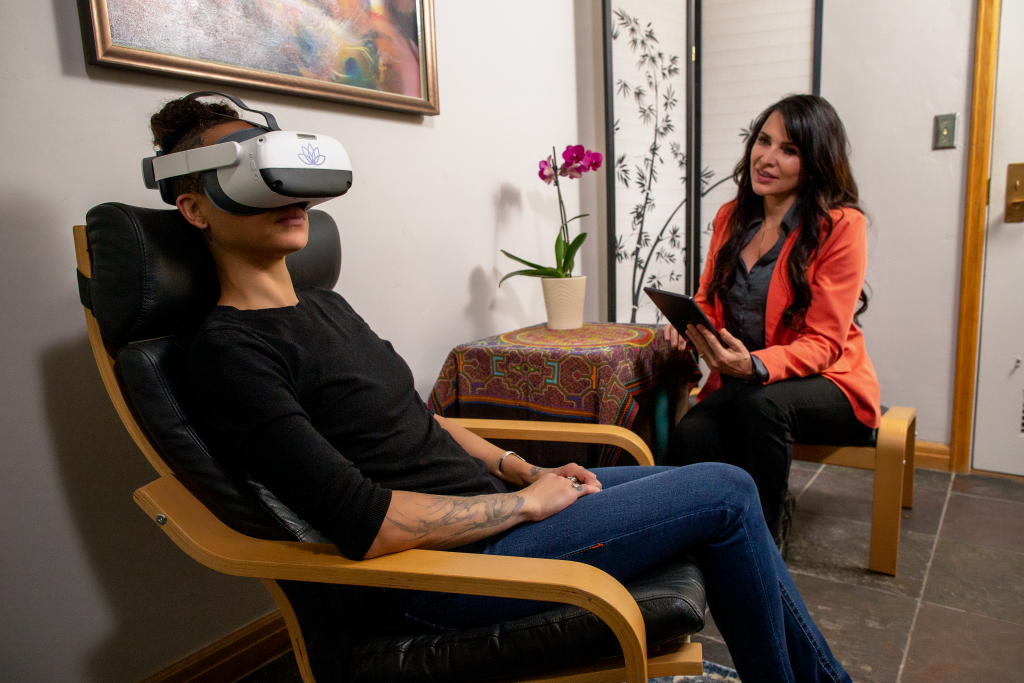Recently, TRIPP PsyAssist completed its Phase 1 Feasibility Study to demonstrate its use as a pretreatment tool for patients undergoing ketamine therapy. This VR solution is an example of emerging technologies that facilitate the development of more accessible and transformative mental health care solutions.
Globally, more than 500 million people have anxiety and depression. That’s more than half of the total estimate of people living with some form of mental illness. However, only a third receive adequate mental health care. Solutions like TRIPP PsyAssist help mental health clinics provide the care their patients need.
Treating Mental Health Disorders With Ketamine Therapy
Many methods are available to treat depression, anxiety, and similar mental health conditions. Using psychedelics, like ketamine, is gaining ground as a fast-acting, non-invasive treatment option. Low doses of ketamine, a dissociative psychedelic drug, are administered intravenously in a clinical setting to patients for several minutes while the patient is observed. Patients typically go through several rounds of these treatments.
While ketamine therapy has numerous clinical studies proving its effectiveness, there remains a need to manage pre-treatment settings. Patients experience the same anxiety before their ketamine therapy sessions, and alleviating their distress will help usher in a more relaxed onboarding and treatment session. There’s also a need to integrate their experiences after the ketamine therapy treatment, both at the clinic and at home.
Using VR to Improve Ketamine Therapy Pre-Treatment Experience
TRIPP is a California-based company pioneering XR wellness technologies for consumers, enterprises, and clinics. Their research-based platform is available across VR, AR, and mobile to help facilitate a deeper self-connection and create collective well-being.

TRIPP is best known for its award-winning consumer platform that creates beautiful meditative VR spaces where users can spend time calming their minds and centering their being. Staying true to its mission of using technology to transform the mind, the company introduced TRIPP PsyAssist, its clinical offering aimed at helping medical institutions use XR to improve their practices.
“At TRIPP, we are dedicated to empowering individuals on their path to healing,” said TRIPP’s CEO and founder Nanea Reeves. They believe that virtual reality has the power to enhance therapeutic interventions, and their research encourages them to explore new frontiers in mental health treatment.
The main objective of Phase 1 of the TRIPP PsyAssist study was to assess whether guided, meditative imagery, which was provided through VR using the Pico Neo 3 Pro Eye headset, could be successfully implemented as a pre-treatment program in an actual clinical setting. The study also aimed to evaluate the level of acceptance of this approach.
The study participants were undergoing ketamine therapy for anxiety or depression at Kadima Neuropsychiatry Institute in San Diego. Kadima’s President, David Feifel, MD, PhD, was excited to partner with TRIPP and have this important feasibility study conducted among its patients.
“VR technology has great potential to enhance mental wellness, and TRIPP PsyAssist is at the forefront of translating that potential into reality,” Feifel said. “This study represents an important step in that direction.”
Improving Patient Experience with TRIPP PsyAssist
The results of the feasibility study were very promising. Eighty percent of the users wanted to use the system frequently, while all of them found the different functions well-integrated. Likewise, 100% of the users felt very confident in using the system.
TRIPP’s Clinical Director of Operations, Sunny Strasburg, LMFT, was delighted with the success of the preliminary results of the feasibility study.

“These findings inspire us to forge ahead in uncovering new frontiers within clinical settings where technology and psychedelic medicine converge,” she said. Strasburg and her team look forward to expanding their study to explore various TRIPP PsyAssist applications in clinical settings.
With Phase 1 of the study completed, TRIPP PsyAssist is set to discover new ways of integrating innovative VR technology into mainstream clinical practices.
Reeves and Strasburg are also attending the MAPS Psychedelic Science Conference, which is taking place this week, where they are showcasing their research and discussing the impact of emerging technologies on mental health treatment. A Kadima booth will also be present to give attendees a demonstration of the transformative potential of the TRIPP platform.
Final Thoughts
Significant advances in research have elevated our knowledge about mental health. However, it remains a critical global health concern as the number of disorders escalates, but the available resources remain sparse.
But there’s a light at the end of the tunnel. Initiatives like TRIPP PsyAssist prove that emerging technology can play a significant role in alleviating mental health problems. This gives us the confidence that the future is bright and that our challenges have a solution at hand.



